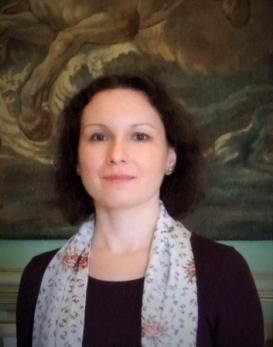
Maria Avxentevskaya
Visiting Senior Research Fellow (2023–2024)
Dr.
Maria Avxentevskaya (Auxent) specializes in the premodern history of science and medicine and the longue durée history of scientific communication, including humanism, semiotics, translation, rhetoric, persuasion, and networking. She received her doctoral degree from the Freie Universität Berlin (2015, with distinction) for her dissertation “How to Discover Things with Words? John Wilkins: From Inventio to Invention.” Her research has been supported by the Max Planck Society, Fritz Thyssen Stiftung, Klassik Stiftung Weimar, the Herzog August Bibliothek, and the Warburg Institute.
Maria is currently working on the monograph Rhetoric and Persuasion in Early Modern English Science. Her publications include the forthcoming Signs and Signification in a Global Comparative Perspective, co-edited with Glenn W. Most (Brill, 2024) and Premodern Experience of the Natural World in Translation, co-edited with Katja Krause and Dror Weil (Routledge, 2022). Maria’s other projects include “The Word and the Brain: Early Modern Neuroscience of Rhetoric and Persuasion” and “The Physician’s Album Amicorum: Humanist Cultures of Knowledge Networking.” She has taught science communication, early modern science, and knowledge in translation at Bard College Berlin, Technische Universität Berlin, and the University of Sydney. Her science journalism pieces have been republished by the Independent and Scientific American.
Projects
Media
Past Events
Panel Discussion
Open Panel Discussion: Performative Philology: Crafting Knowledge in Action
MORESeminar
Liber Nemroth
MORESeminar
Situating Medicine and Religion in Early Imperial China
MORESeminar
Science, Art, Both, or Neither? Maps, Sea Monsters, and the Geopolitics of Disciplinary Canons
MORESeminar
Sources of the Critical Edition of Ibn al-Jazzār’s Medical Handbook
MORESeminar
Sanskrit into Arabic: On the Reception of Ayurvedic Medicine in Early Abbasid Society
MOREResearch Seminar
Early Science in Conversation
MOREWorkshop
Introduction: Indigenous Knowledges and Colonial Sciences in South Asia
MOREWorkshop
The Philology Workshop
MOREReading Group
Signification in Artificial Languages in Early Modern European Thought
MOREResearch Colloquium
"If You Cannot Travel, Read my Book:" Domesticating experiences in "A Treatyse of the Newe India" (1553)
MOREReading Group
Terms, Notions, and Imagery in Chinese Theories of Signification
MOREReading Group
Signification in Sanskrit and in the Indian Colonial Context
MOREReading Group
Experiences and Signification in Medieval Latin Natural Philosophy
MOREReading Group
Name, Thing Named, and Signification in Classic Islamic Theology
MOREReading Group
Signification in Ancient Greek Philosophy
MORE